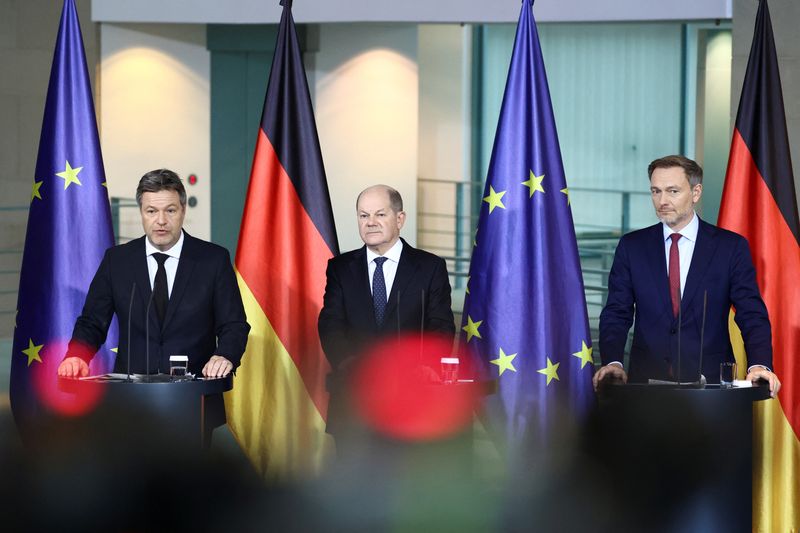By Maria Martinez
BERLIN (Reuters) – Germany’s hastily agreed coalition pact to overcome a legal setback to its budget plans is based mainly on spending cuts that will drag further on already insipid growth in Europe’s largest economy, economists said.
As sought by Finance Minister Christian Lindner, an advocate of budgetary rigour, Germany will reinstate its cap on new net borrowing in 2024 and fill funding gaps worth a total 17 billion euros ($18 billion) largely with cost savings.
With the restrictive monetary policy being pursued by the European Central Bank to tame inflation, and with lingering uncertainty over the policy implications of Wednesday’s budget deal, the risk is that a shallow recession will be prolonged.
“The consolidation corresponds to just under 1% of gross domestic product,” Commerzbank’s chief economist Joerg Kraemer said. “This could potentially dampen economic growth by up to half a percentage point in the coming year.”
The German economy has been one of its weakest this year as high energy costs, feeble global orders and record-high interest rates in the bloc have taken their toll.
A month of fractious negotiations within the government over next year’s budget, after a constitutional court ruling blew a 60 billion euro ($64.70 billion) hole in public finances, had worsened the economic outlook.
The three-party alliance agreed terms for a revised budget on Wednesday. Chancellor Olaf Scholz insisted the government would still achieve its goals with less money after the ruling that it could not redirect unused pandemic emergency funds to its climate and transformation fund.
Among the savings, he said that the fund intended to help companies as they transition towards greener practices would be reduced by 12 billion euros in 2024, with spending cuts also made to the core budget.
Lindner said fiscal consolidation would continue in 2024, with the budget deficit falling to 1.5% of GDP next year from the 2.5% he is targeting for this year.
Commerzbank estimated that gross domestic product would decline by 0.3% in 2024 as fiscal policy acts as an additional brake on activity.
Carsten Brzeski, global head of macro at ING said the measures announced on Wednesday “seem to be manageable for the economy” but that the deal would not end a controversy over how to combine large-scale investments with balanced budgets.
CONSUMERS LOSE OUT
Germany’s debt-to-GDP ratio is low compared to its European neighbours, at 65% in 2022 compared with 117% for France, 148% for Italy and 116% for Spain, according to OECD data.
But memories of how frugality paved the way for postwar reconstruction and how costly it was to reintegrate ex-communist East Germany have shaped a debt-averse political culture.
Scholz said the climate and transformation fund, which supports initiatives such as making buildings more energy-efficient and subsidising renewable electricity and chip production, will still have a total volume of 160 billion euros.
But Marcel Fratzscher, president of the DIW economic institute, criticised the government’s decision to cover the budget shortfall with spending cuts rather than raising taxes or suspending the so-called debt brake again.
“The agreement means that the state will permanently be short of 60 billion euros for climate protection and transformation,” Fratzscher said.
Cuts to existing fossil fuel-linked subsidies will filter through to extra costs for consumers, while moves to reduce state welfare outlays by some 1.5 billion euros will hurt the spending power of low-income German households.
“Citizens are among the losers of this agreement,” said Fratzcher.
Earlier on Wednesday, two German economic institutes cut their growth forecasts, citing uncertainty over the budget, which had unsettled many companies, and the expected consolidation measures to fix it.
The IW predicted a 0.5% contraction next year while the IfW predicted that the budget dispute – including weeks of wrangling within the coalition – would drag economic growth lower by 0.3 percentage points.
“The German government has played a decisive role in this crisis,” IW Director Michael Huether said.
($1 = 0.9269 euros)
(Reporting by Maria Martinez; Editing by Mark John and Catherine Evans)
